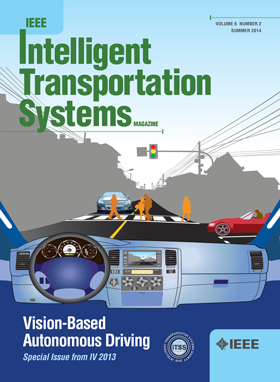Stochastic Energy Scheduling for Urban Railway Smart Grids Considering Distributed EVs Charging and PV Output Uncertainty
IF 8.4
1区 工程技术
Q1 ENGINEERING, CIVIL
IEEE Transactions on Intelligent Transportation Systems
Pub Date : 2025-04-21
DOI:10.1109/TITS.2025.3558735
引用次数: 0
Abstract
In order to improve the utilization rate of regenerative braking energy (RBE) and reduce the operation cost of railway system, this paper proposed an urban railway smart grids (URSG) with efficient and flexible energy management strategy is proposed, which integrates a traction power supply system (TPSS), electric vehicle charging station (EVCS), PV and battery storage. In this study, a bi-level stochastic optimization (BLSO) model is employed to determine the sizing of battery storage and the energy scheduling of URSG. The upper level aims to determine the optimal size of battery storage and minimize the comprehensive cost, considering the degradation of the battery capacity. In the lower level, based on piecewise linearization method, the power transmission loss of catenary is formulated as a linear mathematical model, and a stochastic mixed-integer linear programming model of URSG is established to schedule the power flow to minimize the electrical cost. Furthermore, regarding to the stochastic nature of EV charging behavior and PV output, the constraints with uncertain parameters are posed as chance constraints, for which Sample Average Approximation (SAA) method is introduced to transform chance constraints into deterministic constraints. Based on the actual urban rail transit line and traction load data, the simulation results show that the above system can reduce the cost by 18.16 %.考虑分布式电动汽车充电和光伏输出不确定性的城市轨道智能电网随机能量调度
为了提高制动再生能量的利用率,降低轨道交通系统的运行成本,提出了一种集牵引供电系统(TPSS)、电动汽车充电站(EVCS)、光伏和电池储能于一体的城市轨道交通智能电网(URSG),该电网具有高效灵活的能量管理策略。本研究采用双水平随机优化(BLSO)模型来确定电池储能规模和URSG的能量调度。上层的目标是在考虑电池容量退化的情况下,确定最优的电池储能规模,并使综合成本最小化。在下层,基于分段线性化方法,将接触网的输电损耗表述为线性数学模型,并建立了URSG的随机混合整数线性规划模型,对潮流进行调度,使电力成本最小化。在此基础上,针对电动汽车充电行为和光伏发电输出的随机特性,将具有不确定参数的约束作为机会约束,并引入样本平均逼近(SAA)方法将机会约束转化为确定性约束。基于实际城市轨道交通线路和牵引负荷数据,仿真结果表明,该系统可降低18.16%的成本。
本文章由计算机程序翻译,如有差异,请以英文原文为准。
求助全文
约1分钟内获得全文
求助全文
来源期刊

IEEE Transactions on Intelligent Transportation Systems
工程技术-工程:电子与电气
CiteScore
14.80
自引率
12.90%
发文量
1872
审稿时长
7.5 months
期刊介绍:
The theoretical, experimental and operational aspects of electrical and electronics engineering and information technologies as applied to Intelligent Transportation Systems (ITS). Intelligent Transportation Systems are defined as those systems utilizing synergistic technologies and systems engineering concepts to develop and improve transportation systems of all kinds. The scope of this interdisciplinary activity includes the promotion, consolidation and coordination of ITS technical activities among IEEE entities, and providing a focus for cooperative activities, both internally and externally.
 求助内容:
求助内容: 应助结果提醒方式:
应助结果提醒方式:


